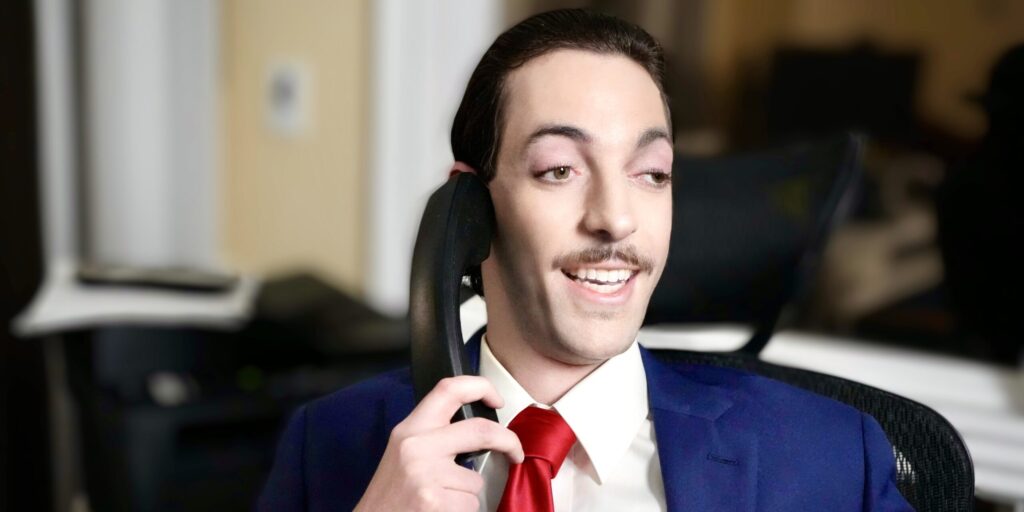
MDA Ambassador Guest Blog: From Deals to Disabilities: How a Serial Entrepreneur is Innovating Accessibility
By Naji Nizam | Friday, October 18, 2024
5 Second Summary
MDA Ambassadors play an essential role in furthering MDA’s mission while representing and empowering the neuromuscular disease community. Quest Ambassador Guest Blog series provides a platform to share their personal stories, perspectives, and experience.
Naji Nizam is a 28-year-old New York-based serial entrepreneur, real estate developer, and disability rights advocate with a neuromuscular condition called Centronuclear Myopathy. He has conducted millions in real estate transactions globally and advised on countless accessibility projects, including NYC’s Penn Station. Some fun facts about Naji are: he is fluent in three languages, played varsity football in high school, and has been a published researcher since he was 22 years old. The best way to follow or contact Naji is via LinkedIn. Make sure to let him know where you heard about him!
As a serial entrepreneur and disability rights advocate, I’ve always believed that great achievements stem from the power of collaboration and community. My professional experience spans a variety of industries, including real estate, insurance, hospitality, and finance. However, one of my most rewarding experiences has been serving as a liaison to the MTA/LIRR ADA Committee and advising on accessibility improvements at New York City’s Penn Station.
Penn Station, as one of the busiest transportation hubs in the world, is more than just a gateway to New York City. It represents a lifeline for millions of commuters and travelers, including those with disabilities who rely on its accessibility to navigate the city. However, like many older infrastructures, Penn Station faced significant challenges in ensuring that it met the accessibility needs of all users. My role on the MTA/LIRR ADA Committee allowed me to address these challenges head-on, collaborating with stakeholders to identify and implement meaningful solutions.
A journey of advocacy and impact

Naji Nizam giving a presentation
My work with the MTA/LIRR ADA Committee and on accessibility improvements at Penn Station began with a simple yet profound goal: to ensure that everyone, regardless of physical ability, could access and benefit from the station’s services. It was a task that required not only an understanding of the architectural and logistical barriers within the station but also a deep empathy for the individuals whose daily lives were affected by these limitations.
With my background in real estate and project management, I approached this endeavor with a strategic mindset. I engaged with key stakeholders to assess the station’s existing conditions and identify areas for improvement. We examined everything from elevator placements and platform access to signage and communication systems. My experience in negotiating complex transactions and my passion for advocacy enabled me to bridge the gap between different parties, fostering open dialogue and collaboration.
Living with a disability has given me a firsthand understanding of the barriers that others may overlook, even well-intentioned committee members. My experience enables me to identify challenges that aren’t always obvious, and it helps me evaluate proposed solutions with a critical eye. What might seem fully accessible to someone without a disability can sometimes fall short when considering the diverse needs of the disabled community. This perspective allows me to advocate for more comprehensive inclusivity solutions that serve a broader range of individuals.
One of the significant challenges we faced was balancing the historic elements of Penn Station with the need for modern accessibility features. This required a creative approach, blending the old with the new in a way that respected the station’s architectural integrity while enhancing its functionality. Our team proposed solutions, including enhanced lighting to provide greater accessibility and safety for passengers with disabilities and passengers without disabilities alike.
Building partnerships for progress:
Serving as a liaison to the MTA/LIRR ADA Committee meant more than just sitting at a table and voicing my opinions; it involved building partnerships with various organizations and community groups. I knew that to make a genuine impact, we needed to bring everyone to the table—commuters, disability rights advocates, engineers, and city officials. My role was to act as a bridge, ensuring that the needs of all parties were considered and that our proposed solutions reflected a truly inclusive vision.
To achieve this, I spent countless hours in meetings, workshops, and public forums, listening to feedback and gathering insights from those directly affected by the station’s accessibility shortcomings. I advocated for the inclusion of voices often marginalized in these discussions, believing firmly that the best solutions are born from diverse perspectives. This approach not only helped to foster a sense of shared purpose but also ensured that our plans were realistic, actionable, and grounded in the real-world experiences of those who used Penn Station every day.
Overcoming challenges and celebrating milestones:
Of course, no major project comes without its fair share of obstacles. Navigating the complexities of public infrastructure, budget constraints, and differing stakeholder priorities required resilience and determination. Yet, each challenge presented an opportunity for growth, learning, and innovation. We encountered setbacks, such as funding limitations and unforeseen structural issues, but we tackled these hurdles with a commitment to find practical, effective solutions.
One of my proudest moments during this process was witnessing the tangible improvements that were made as a result of our collective efforts. From the installation of new elevators to the enhancement of wayfinding systems, each change represented a step forward in our mission to create a more accessible Penn Station. These improvements not only benefited individuals with disabilities but also enhanced the overall experience for all commuters, reflecting our shared goal of building a truly inclusive transit hub.
The road ahead: continuing the journey of advocacy–

Naji Nizam
While much has been accomplished, the journey toward full accessibility is ongoing. As I reflect on my experience, I am filled with gratitude for the opportunity to contribute to such an important cause. I’ve learned that accessibility is not a one-time project but a continuous commitment to listening, learning, and improving.
As I continue my work in advocacy, business, and beyond, I remain committed to promoting accessibility and inclusion in every endeavor. Whether I am advising on a large-scale infrastructure project or underwriting a new real estate project, my approach is always rooted in the belief that every individual deserves access to the opportunities and experiences that shape our world.
New York City’s Penn Station stands as a testament to what can be achieved when passionate individuals and organizations come together with a common purpose. The accessibility upgrades we’ve achieved serve as proof that with collaboration, innovation, and unwavering commitment, we can create spaces that are not only functional and efficient but also welcoming and accessible to all.
I look forward to continuing this journey and embracing new opportunities to make a difference, one project at a time. Together, we can build a world where accessibility is not an afterthought but a fundamental principle that guides everything we do.
Next Steps and Useful Resources
- To learn more about centronuclear myopathies, visit here.
- Get tips on accessible outdoor activities here.
- MDA’s Resource Center provides support, guidance, and resources for patients and families. Contact the MDA Resource Center at 1-833-ASK-MDA1 or ResourceCenter@mdausa.org
- Stay up-to-date on Quest content! Subscribe to Quest Magazine and Newsletter.
Disclaimer: No content on this site should ever be used as a substitute for direct medical advice from your doctor or other qualified clinician.




